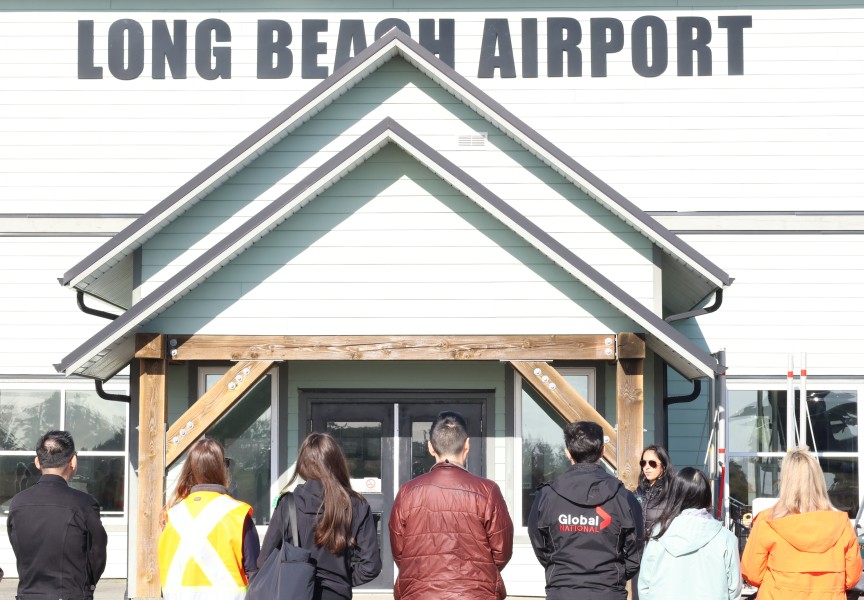The Council of Ha’wiih, which met at the House of Unity on Oct. 6 and 7, took a firm stand with Fisheries and Oceans Canada against additional crab licences that Canada is planning to transfer to Clayoquot Sound.
Kiista, Keith Atleo, said he is concerned about DFO’s consultation process. DFO ‘consulted’ with a former Ahousaht councillor, he said, when they sought approval to transfer the crab licences. Proper consultation with Ahousaht, he told them, did not happen.
“The resource is dwindling and crab is a large part of our diet,” said Kiista.
“It’s not only us that are complaining. The local commercial crab fishermen don’t like all the new licences coming in,” said Ahousaht Councillor Angus Campbell.
“Why are they moving the licences here? Is it because it’s crappy everywhere else,” Campbell asked. Next thing you know we will have nothing between that and the sea otters wiping it out, he continued.
The Ahousaht Ha’wiih stood before Gerry Kelly and Kent Spencer of DFO to declare they will not allow any more crab licenses in Ahousaht territory.
“It’s Canada’s law that Kou-uss’ needs are second only to conservation. There will be no more traps in our territory. That’s a firm message from Ahousaht. We will not allow this transfer to happen. Take that message to your bosses,” said Wickaninnish, Cliff Atleo, speaking on behalf of Ahousaht Ha’wiih.
Andrew Jackson, Tla-o-qui-aht Fisheries Manager, said they too will not allow any more licenses to be moved to their territory until they’ve had proper consultation.
Kelly said he would like to sit down with Ahousaht to get a better understanding of the issue from the Ahousaht perspective.
The Ha'wiih also discussed their ongoing concerns for returns of herring to Vancouver Island’s west coast. Earlier this year Nuu-chah-nulth fishermen set trees where herring were spawning and the result was very poor. There were not enough egg layers to bother harvesting. Most trees were totally bare of any herring spawn.
DFO contracted Nuu-chah-nulth monitors and their result was the same: they observed very poor returns in small spawns that didn’t last long. Nobody saw any abundance of herring and no significant spawn. The Nations and their Ha’wiih have decided that there will be no herring fishery in their territories in 2016.
Nuu-chah-nulth Tribal Council President Deb Foxcroft had sent a letter to DFO Minister Gail Shea in July 2015 expressing the concerns of the Ha’wiih and Nuu-chah-nulth Nations to conserve and protect WCVI herring.
The letter also recommended that the herring fishery remain closed for 2016 and instead continue to make progress on revising the Herring Management Framework and rebuilding herring on WCVI.
In their meeting with DFO, the Ha’wiih asked why they must fight to protect the herring stocks on a year-by-year basis. They said they wanted to get away from this annual crisis. They said they spent the last two years fighting an ill-conceived commercial fishery. The Ha’wiih said that they need to see positive signs that stocks are improving.
According to Simon Lucas, Hesquiaht hasn’t seen enough herring roe to harvest for their food and ceremonial in their territory for nine years.
DFO uses different models for measuring herring abundance and in recent years the DFO model estimates do not correspond with the observations of experienced Nuu-chah-nulth harvesters.
Nuu-chah-nulth fishermen said there wasn't enough while DFO did not agree.
“There are different interpretations of stock abundance which has been the root of our discussions in past years; we're hoping the technical working group can break through that,” said Kelly.
Spencer described what DFO did last season to collect information about herring abundance. In the end, he admitted that their information corresponds with what the Nations are saying; that the WCVI herring stocks are depleted.
He went on to say that their scientific information will be released in late October. Their management plan will be released in December and DFO will be looking for input/consultation from First Nations and other stakeholders.
“There’s plenty of herring in other coastal areas to meet the limited market demand; industry, DFO and First Nations would be better off working together building a viable herring management strategy rather than having another fight to keep it closed in 2016,” said NTC Fisheries Manager Don Hall
“We will fight anybody who tries to destroy the resources,” said Atleo. “Believe me; we will never back down as long as it’s for the future generations,” he added.
The next Council of Ha’wiih meeting is scheduled for Feb. 22 and Feb. 23 to be hosted by Hupacasath First Nation.






